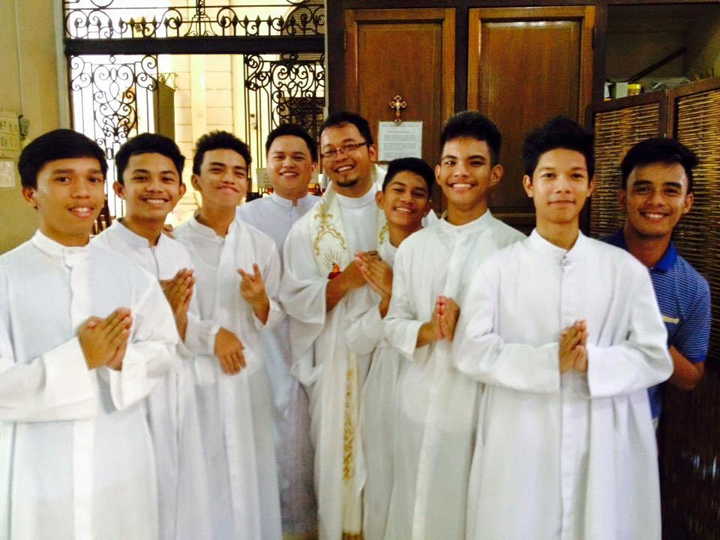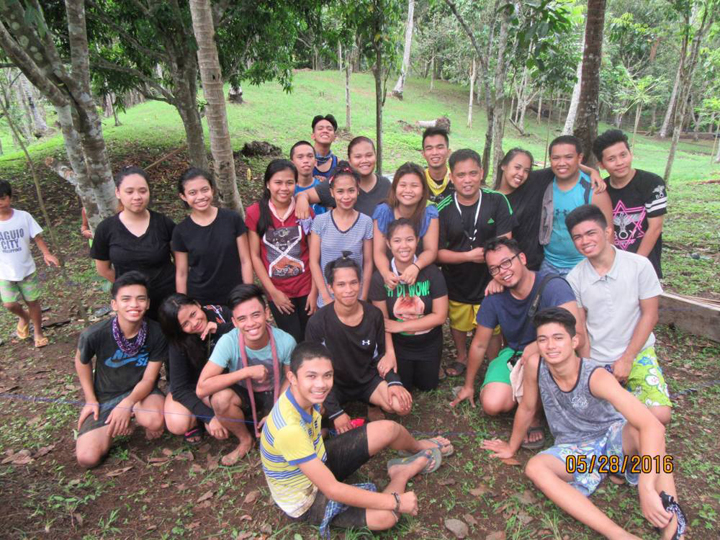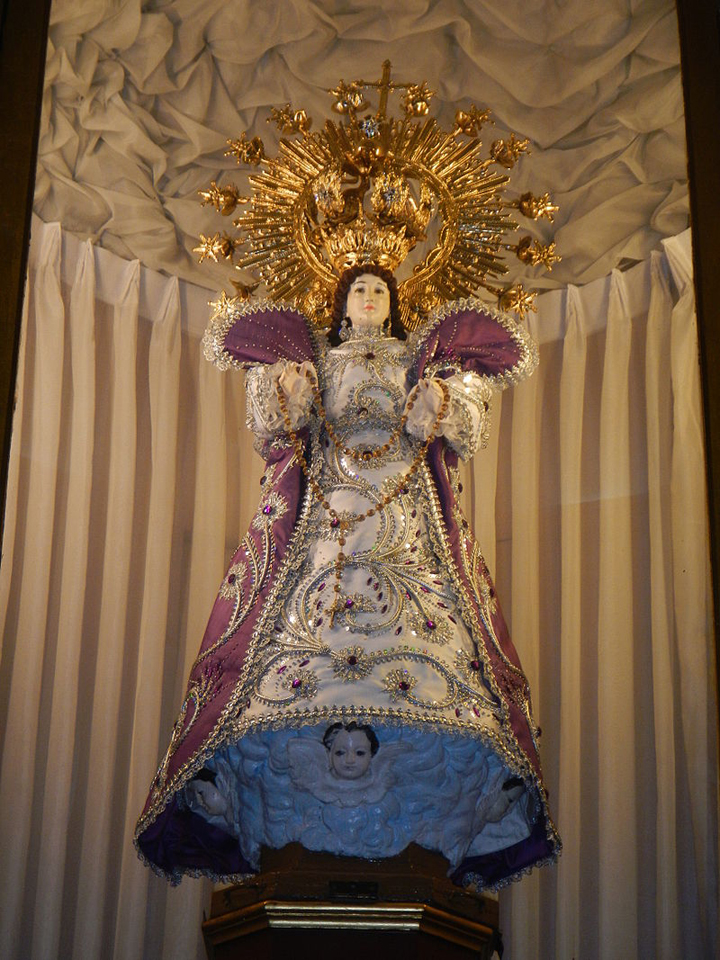When Church Means Home
By Fr Kurt Zion Pala
Father Kurt is from Iligan City, Lanao del Norte, and was ordained priest in November 2015. He spent two years in Fiji on First Mission Assignment while still a seminarian and a year in Malate Parish, Manila, first as deacon and then as priest. He is currently based in Cagayan de Oro involved in vocations work and mission promotion. He will be taking up an assignment in Myanmar early in 2017. You will find links to previous articles by Father Kurt here.

Father Kurt with altar servers in Malate Church, Manila
Just after I had celebrated Mass in Our Lady of Remedies Church, Malate, Manila, an altar server came up to me and told me that a youth who had decided to leave home wanted to speak to me. I saw a bag in the guard house and I got nervous thinking the story must really be true. I knew the boy in question and when I found him his eyes were red from crying. So I invited him to one of the counseling/confession rooms in the convento. He sat down and started to sob.
After an argument with his mother she told him to leave the house unless he stopped being an altar server. He explained that he had done everything his mother had told him to do but could not leave the church or stop being an altar server. He said, ‘Ang simbahan po para sa akin ay tahanan hindi tulad sa bahay’ (‘The church is like a home to me, unlike the house I live in’). He felt at home and free to be himself in the church. I tried my best to calm him down and asked him to go back home. After a little more convincing he told me he would.

Father Kurt on an outing with young people from Malate
After my ordination as a deacon in May 2015 I joined the parish team in Malate Parish. I started to assist one of the priests in the parish youth ministry and later on took over from him. Building on what had been started and organized, we continued to conduct monthly general assemblies for the youth and faith-sharing sessions twice a month.
Most of the young people involved come from difficult family situations and many of them consider Malate Church their home. One girl shared how her mother was addicted to drugs, taking them to help her keep up with work, but leaving her siblings to her to care of. Another shared that she found herself alone because her parents, now separated and with new families, had left her with her maternal grandmother. She envied her friends with families to call their own. A boy told me that his mother was angry at him because he reminded her of his father who had left her. His mother had a family now and introduced him to his step-brothers as a cousin. A 14-year-old girl shared that she went home late, drunk but pretending to be sick. Her mother continued to look after her probably knowing that she was not sick at all but drunk. The girl shared that she continued to be angry at her parents, but not knowing why. There is so much hurt and pain in these stories.

A ‘snowstorm’ in the tropics?
But there is hope. Knowing that the parish and the Church is there for them, many ‘come home’ to the Church to be nourished – to feel accepted and needed. To see them laugh and enjoy being who they are is really heart-warming and life-giving. People notice that the young people are alive. The church is alive.
Working with the youth in Malate has strengthened my conviction in the words of Pope Francis who said in one of his interviews, ‘This Church with which we should be thinking is the home of all, not a small chapel that can hold only a small group of selected people. We must not reduce the bosom of the universal church to a nest protecting our mediocrity.’
The church is a home particularly to vulnerable groups of people like many of our youth looking for the attention and affection often lacking or missing in their family life. Most of them just want to be listened to and to feel they belong and are needed. The parish has been providing opportunities for them to take on responsibilities and to show their talents.

Being ‘grounded in reality’
In the final month of my stay in Malate the young people I had been working with held a ‘surprise farewell’ for me. And it really was a surprise. As they shared one after the other, I could not help but cry a lot inside and held back my tears. But a few fell, not tears of sadness but of joy listening to my young friends. I often wondered how I was able to survive a year with these crazy, beautiful ‘inside-out’ young persons. They called me by so many different names from ‘Kuya’, ‘Older brother’, to ‘Pads’, short for ‘Father’, to names only they could understand. I learned to speak their lingo and listened to their stories.
My two years in Fiji as a missionary, where I spent much time with young people, and now working with Filipino young people, have been an inspiring, learning, at times disheartening, but mostly joyful, challenging and fulfilling experience for me. Thank you! You all taught me that it is okay to be me.
‘God calls us to be faithful, not successful’, as Antonio Luis Cardinal Tagle, Archbishop of Manila, said at the closing of a youth program, quoting Mother Teresa of Kolkata. True, today young people are trained to be successful in life, to find their value in terms of how they look by the standards of the world or in terms of accomplishments measured in awards and grades. At the Third Philippine Conference on the New Evangelization Cardinal Tagle commented that we are trained to be problem-solvers. We are anxious to find solutions to everything because we make everything a problem. He suggested that instead of seeing everything as a problem we should treat them as dilemmas. Life is a dilemma – a reality we live with, not a problem to be solved. In turn we are called to be faithful, not successful problem-solvers.

For the LORD takes delight in his people, honors the poor with victory (Psalm 149:4)
Young people are not problems to be solved, not mere objects of the Church. They are the Church, too. And when young people consider the Church home, I think we have truly become the Church Jesus intended us to be – a home for every one. A comment from a young person that continues to stick with me is that ‘God does not always give what we want but God always gives what we need’. And I believe the Church is God’s response to our need. That comment of the young boy who said, ‘Ang simbahan po para sa akin ay tahanan hindi tulad sa bahay’, ‘The church is like a home for me, unlike the house I live in’, is a reminder to us adults to welcome every young person as Jesus welcomed every child who came to Him, a reminder for us to be a home to everyone.
Never give up on our young people.
Our Lady of Remedies, Malate Church


